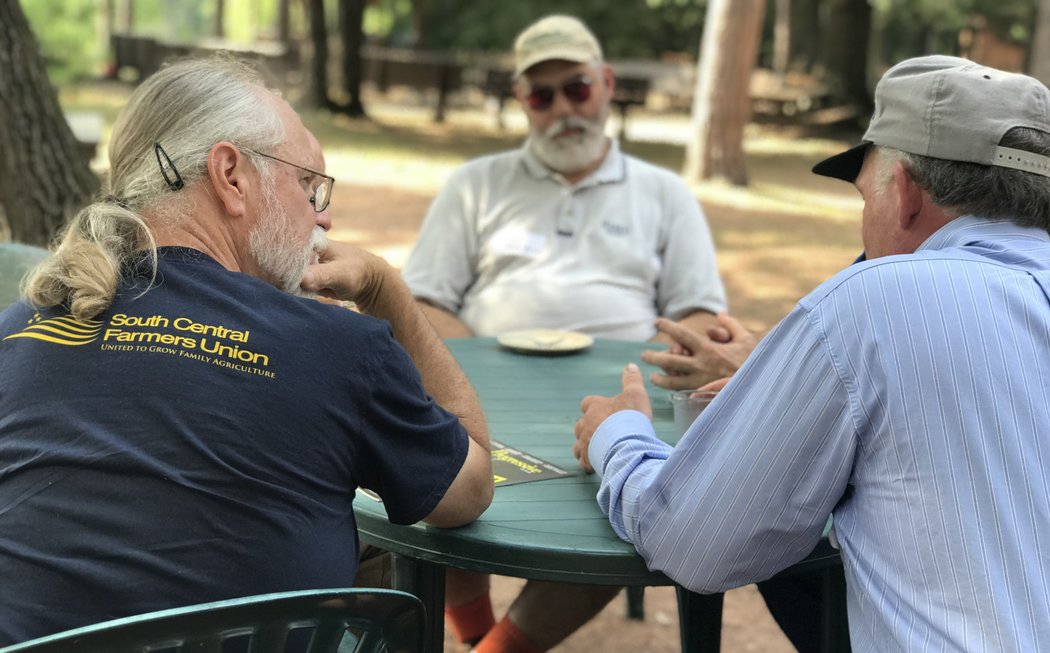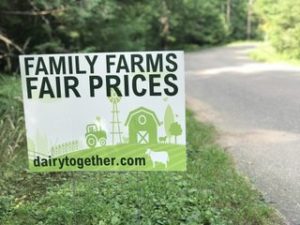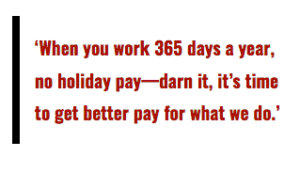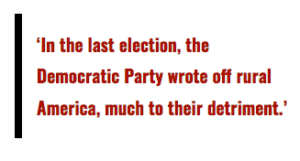The Progressive: ‘It Brings Us All to the Same Table’: Meet The New Progressive Farmers

New Glarus, Wisconsin tree farmer Harry Pulliam, left, talks with fellow farmers and Wisconsin Farmers Union members Bill Helmquist, center, and Ken Schmitt at the groups annual summer meeting in August 2018.
by Alexandra Tempus | August 19, 2018
Wisconsin farmers, like rural folks across America post-2016 election, are reclaiming their legacy as key players in the country’s progressive movement.
Two days after Wisconsin’s primary election, on the shores of one of the state’s 15,000 lakes in a log cabin at the end of a winding country road, a group of farmers met to talk political strategy.
There were the usual markers of such a meeting: Old white men in suspenders and adjustable-back trucker caps, chatter about keeping the kids on the farm, shredded beef and plastic crates of carton milk at the buffet lunch.
But there were unexpected elements, too: A man with a ponytail. A woman and her daughter in hijab. Young people with newborn babies in tow. A vegetarian option alongside the shredded beef.
“Rural America is not a monolith,” Tommy Enright, one of the event coordinators, tells me. “We’re are very diverse, with very diverse points of view.”

Sign outside of the Wisconsin Farmers Union’s Kamp Kenwood, where they held their annual summer meeting in August 2018.
In the process, the attendees made it clear that many Wisconsin farmers, like rural folks across America post-2016 election, are reclaiming their legacy as key players in the country’s progressive movement.
One part of the gathering highlighted lessons in strategic messaging from communications guru Anat Shenker-Osorio. Her work was just weeks earlier prominently featured at the glitzy Netroots Nation conference, where progressive political insiders rubbed elbows with high-profile guests including Massachusetts Senator Elizabeth Warren, New York gubernatorial candidate (and former Sex and the City actor) Cynthia Nixon, and new-rockstar-on-the-block, New York Congressional candidate Alexandria Ocasio-Cortez.
“They think we’re still wearing bib overalls, and we got a hunk of straw and we’re wearing straw hats,” says Tina Hinchley, a union district director who runs a large dairy farm in Dane County, Wisconsin, not far from the capital city of Madison. “But we’re all professionals. And we have to be professionals because the amount of money and inputs that we’re putting into our farm and what is going out, it’s mind-boggling.”
 And as professionals, Hinchley and others at the meeting tell The Progressive, they’re fed up. In recent years, farmers in America’s dairyland have been dealing with a milk price crisis exacerbated by Republican governor Scott Walker’s push to increase the state’s annual milk production to 30 billion pounds (or 3.5 billion gallons) by 2020. Farmers literally flooded the market with milk, blowing past Walker’s goal, which, in combination with other factors, dramatically drove down prices.
And as professionals, Hinchley and others at the meeting tell The Progressive, they’re fed up. In recent years, farmers in America’s dairyland have been dealing with a milk price crisis exacerbated by Republican governor Scott Walker’s push to increase the state’s annual milk production to 30 billion pounds (or 3.5 billion gallons) by 2020. Farmers literally flooded the market with milk, blowing past Walker’s goal, which, in combination with other factors, dramatically drove down prices.
This played out on top of other, long-standing policies that have made it hard for family farms to survive. In 2006, it became more difficult for municipalities to reject the establishment of (most often large) livestock operations on local land. Wisconsin’s anti-corporate farming law has been drilled with loopholes since it was first established in 1978.
“We have forty years of policies that do not work,” Marathon County dairy farmer Keith Kreager tells the crowd from the front podium.
“When you work 365 days a year, no holiday pay,” he adds to an eruption of applause, “darn it, it’s time to get better pay for what we do.”
Rural Midwesterners have long been key members of populist movements that pushed for progressive advances: worker protections, nationalized transportation and communications services, fair pay, and fair taxes. The Wisconsin Farmers Union notes its own history coming out of the Great Depression: “Those desperate times gave birth to many progressive ideas with which [we] became closely identified.”
Yet these same people became recruits in a culture war waged over the last half-century by conservatives to advance an economic agenda that benefits the wealthy elite—what journalist and political analyst Thomas Frank termed “the backlash” in his 2004 book, What’s the Matter with Kansas? In it, the author describes an America of “sturdy blue collar patriots reciting the Pledge as they strangle their own life chances; of small farmers proudly voting themselves off the land.”
Since this turn, farmers of all stripes across the nation have strongly identified as conservative. But things are changing.
“In the last election, the Democratic Party wrote off rural America, much to their detriment,” says Harry Pulliam, who farms trees near New Glarus, Wisconsin.
And new faces of the Democratic Party have taken note. When Senator Tammy Duckworth of Illinois told CNN’s State of the Union, in reference to Bronx candidate Ocasio-Cortez’s progressive platform, “I don’t think that you can go too far to the left and still win the Midwest,” Ocasio-Cortez begged to differ.
 “With respect to the Senator, strong, clear advocacy for working class Americans isn’t just for the Bronx,” she tweeted. “[In the 2016 primary election Vermont Senator Bernie] Sanders won: Michigan, Minnesota, Kansas, Nebraska, Wisconsin, Indiana.”
“With respect to the Senator, strong, clear advocacy for working class Americans isn’t just for the Bronx,” she tweeted. “[In the 2016 primary election Vermont Senator Bernie] Sanders won: Michigan, Minnesota, Kansas, Nebraska, Wisconsin, Indiana.”
Since then, Ocasio-Cortez has hit the road with Sanders in places like Kansas, where, The New Yorker reported, she touted her support for Medicare-for-all and free college tuition: “They said the people of Kansas did not want these things. They told me I would not be welcomed. But you have proven them wrong.”
“There are plenty of people in rural America who share the same views as urban-dwellers,” says Enright, a communications associate for the farmers union. “People need to talk to each other more.”
After his speech, I speak with Keith Kreager, who sports a deep brown farmer’s tan but talks like an urban-millennial member of the Democratic Socialists of America.
“Why are you hearing from the consumer, ‘I wouldn’t mind giving an extra dollar for a gallon of milk if I knew it was going back to the farmer?’ ” he asks me. “I don’t want to see the neighbors going out. My neighbors, we work back and forth together—I wish there was more of that going on.”
Alicia Razvi, the woman in hijab, tells me she was elected president of her county Wisconsin Farmers Union chapter the week after the 2016 election. It felt like a reaffirmation of her place in America, she says, even as an out-and-out Islamophobe took the country’s highest office.
Razvi, who with her family runs Wooly Thyme, a “micro-farm” that provides produce and other goods to fifteen families near Stevens Point, Wisconsin, says she found a home working with other farmers on the issues that affect them all.
“Accentuating that commonality is so powerful: ‘You love grown food? I love grown food!’ ” Razvi says with a laugh as we chat during the post-meeting pie social. “It really brings us all to the same table.”
At that moment, one of the older white men of the group approaches to shake her hand. “Good to see you again,” he says. “I hear a lot about you. I’m so proud.”